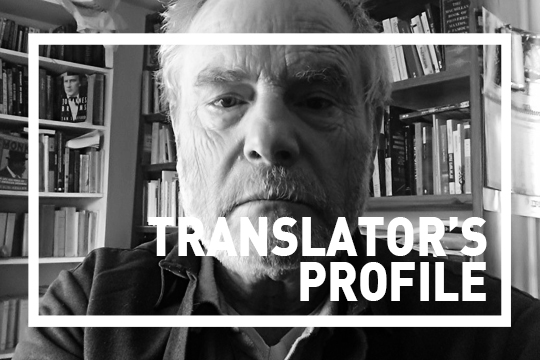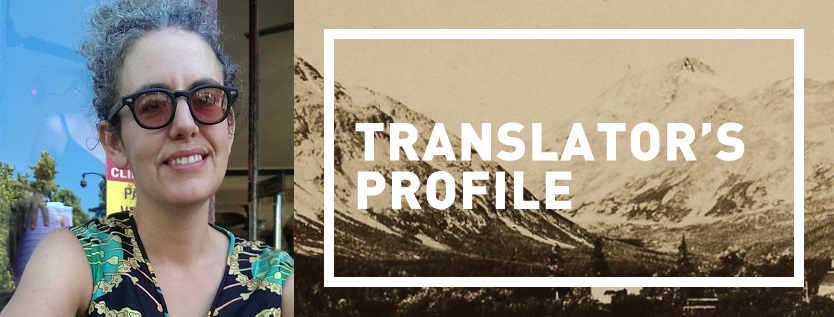Posts filed under 'Translator’s Profile'
Asymptote Podcast: Favorite Readings of 2017
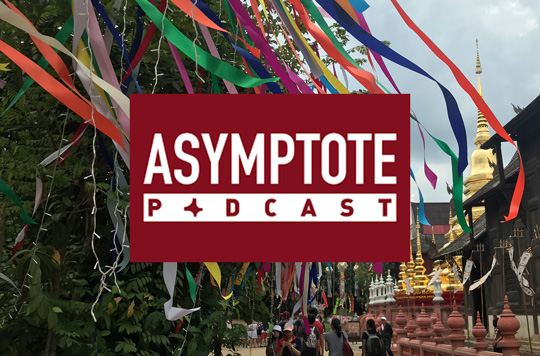
Start out 2018 right by taking a listen to our favorite readings published over the last year.
Translator Profile: Lydia Davis
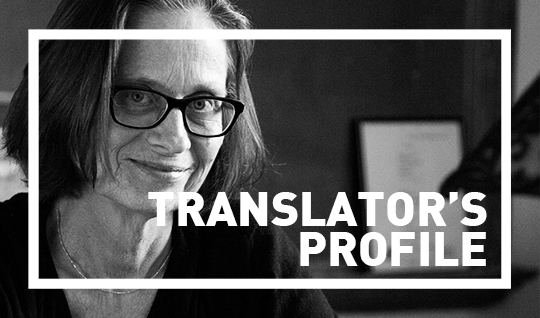
I began to see that I enjoyed [translation] and also that it was a form of writing I could do without the problem of having to be "inspired."
Lydia Davis is the author of one novel and seven story collections, the most recent of which is Can’t and Won’t (2014). Her Collected Stories was published in 2009. She is also the translator, from the French, of Swann’s Way (2003) and Madame Bovary (2010) and has been appointed, this year, the French-American Foundation’s inaugural Laureate in Translation. A bi-lingual edition of her translations from the Dutch, of the very short stories of A.L. Snijders, first presented in our Fall 2011 issue, will be published in Amsterdam by AFdH in September.
Who are you and what do you translate?
I’m Lydia Davis, both fiction writer and translator. I’ve been both for as long as I can remember, and they complement each other nicely. I spent decades translating from French and then, about ten years ago, started widening my scope of languages—first with Spanish, then with Dutch and German. I’ve also—just for the challenge—translated one story from the Portuguese and a few from the two principal Norwegian languages.
I should add, since you asked what I translate, not from which languages, that my most recent major translations from French were Proust’s Swann’s Way and Flaubert’s Madame Bovary. After those two projects, which occupied several years each, I vowed to translate only very short stories. I have mainly stuck to that vow. READ MORE…
Translator’s Profile: Peter McCambridge
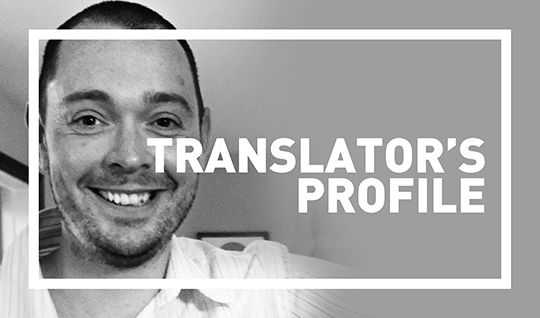
My first favourite writer was Roddy Doyle. I’d also enjoy sitting down for a pint of Guinness with Roddy.
Originally from Ireland, award-winning translator Peter McCambridge holds a BA in modern languages from Cambridge University, England, and has lived in Quebec City since 2003. He runs Québec Reads and now QC Fiction, which recently published Eric Dupont‘s Life in the Court of Matane, excerpted in Asymptote’s Translation Tuesday showcase on the blog and at The Guardian here.
Who is your favorite fictional character of all time?
At the risk of starting off a little lowbrow, I’d have to say Bernard Samson, the glass-half-full spy of Len Deighton’s “airport thriller” series. Nobody else comes remotely close, off the top of my head. I first read more or less everything Len Deighton had ever written when I was 11 to 14 and I’ve recently gone back to them in the new audio version. They go down perfectly after a hard day’s work. A hearty German meal in Berlin with Bernie and Werner and I’d be a very happy man, I think.
Who was your first favorite writer and how old were you when you discovered them?
In high school, the only thing I read and really loved was Edith Wharton’s The Age of Innocence. Thomas Hardy and a lot of other writers who were forced upon me left me cold. It’s funny: I’ve spent a lot of my life reading books that I’ve had to read. At university, I studied French and German literature, which didn’t leave much time for reading for fun. Looking back, a very small percentage of those books were ones that I really enjoyed and would happily read again. When I was younger, around 10 or 11, I remember reading The Secret Seven and a Hardy Boys adventure every night. To answer your question, I think my first favourite writer was Roddy Doyle. I’d also enjoy sitting down for a pint of Guinness with Roddy.
What is your favorite word in any language? Which word do you find most difficult to translate?
I’ve always liked tamisé in French, just for the way it sounds. I always think it sounds soft, like the lighting it describes.
What 5 books would you want with you if you were stranded on a desert island?
To the Lighthouse and The Age of Innocence were both amazing and really left a mark on me. I’d also bring Ulysses and finish working my way through it with the help of Frank Delaney’s wonderful Re:Joyce podcasts. The next two books on my hopelessly long to-read list would make up the five.
Which under-translated author do you think deserves wider recognition worldwide?
The obvious, truthful answer is Eric Dupont. He’s been compared in Québec to our very own Gabriel García Márquez and John Irving. I’m working hard to raise his profile through QC Fiction and Québec Reads.
Do you have a translation philosophy that guides your work?
I worked for a few years translating advertising copy, legal contracts, recipes, and healthcare leaflets before thinking about translating a novel. More importantly, I was revised the whole time and I learned a lot. My employer’s philosophy rubbed off on me and that was to write what the author would have put had they been writing in English. It’s harder than it sounds. “The original sentence tells the translator what the sentence should say but not how exactly to say it,” Lazer Lederhendler told me recently, and I think that sums it up well.
Which of the translations that you’ve worked on was the most challenging? Why?
I felt a lot of pressure translating Lori Saint-Martin’s The Closed Door. But Lori is one of Canada’s best and best-known translators into French so she was a big help along the way.
How did you learn your foreign language and how did you begin working as a literary translator?
I learned French and German in high school in Ireland, then studied French and German literature at Cambridge. But I like to say that I began speaking French when I moved to Québec City in 2003. Moving to Québec meant I forgot all my German. Only for me to meet and marry a German girl here. Which meant I suddenly had to relearn everything. And then try to understand Schwäbisch. Now we speak German at home and French to our friends and children.
If you could have been born in a culture other than your own which would you choose to be a member of? Why?
That’s an easy one: Québec. I moved here so that my children would have that chance.
If you hadn’t been a translator what profession would you like to have tried?
At the minute, I’m kind of switching professions as I try to devote more time to being a fiction editor. But otherwise I think I’d be writing for a magazine somewhere (since soccer goalie is probably not a very realistic answer).
Finally, in your bio, you mentioned that Life in the Court of Matane is the book that made you want to be a literary translator. Could you explain briefly why?
It’s hard to explain. I read Bestiaire, as it’s known in the original French, when it first came out and just fell in love with it. I still love it today—even after spending a year translating it! Now it’s like living with someone: you can’t quite explain what attracted you in the first place, you just know your life is better with them in it.
Translator’s Profile: Mirza Purić
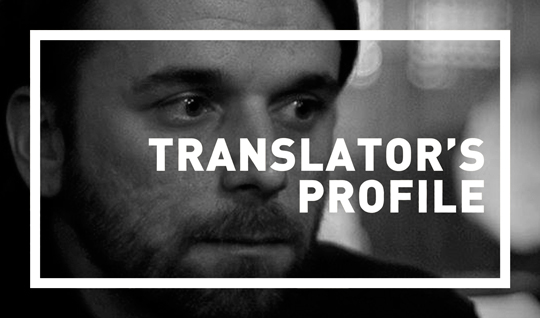
Q & A with Bosnian translator and Asymptote editor-at-large Mirza Purić
Mirza Purić (b. 1979) is a translator and musician. A graduate of the University of Vienna, he has been an Editor-at-Large with Asymptote since 2014.
***
Who are you and what do you translate?
Out of necessity, I’ll translate whatever will bring home the bacon, but what I am is a literary translator. When I set out years ago I worked on fiction almost exclusively. These days I mostly do poetry, I don’t know how that happened. I also play obnoxious music on a bastard instrument which is neither a bass nor a guitar. I’m not sure if this answers the first question.
Describe your current/most recent project. Why is it cool? What should we know about it?
I’m working on a selection of poems by Yusef Komunyakaa, who is one of my favourite poets. There’s this sad cliché that says you can’t write about music just like you can’t dance about sculpture, or something to that effect. Whoever came up with that nugget of brilliance has obviously never read Komunyakaa. Apart from that, I try to make myself available to young, up-and-coming authors, people who swim against the tide and/or operate outside of the mainstream, so I’m always on stand-by for Sarajevo Writer’s Workshop, a group of promising young writers and poets founded by the American writer Stacy Mattingly (check out her essay on a project she led for the University of Iowa’s International Writing Program). As Asymptote’s editor-at-large I constantly snoop about for new talent. This country being what it is, a lot of gifted people don’t have a platform. Asymptote provides one, and I do what I can to help these people hop on it. READ MORE…
Translator’s Profile: Yardenne Greenspan
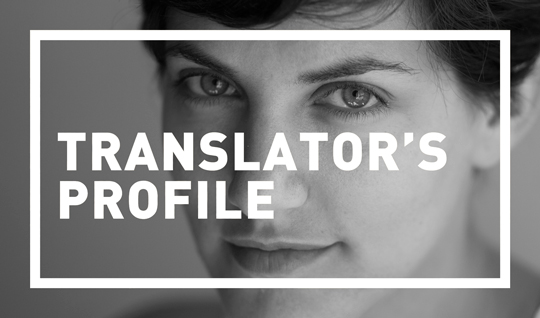
"I also sometimes fantasize about acting or opening a bakery."
Yardenne Greenspan has an MFA in Fiction and Translation from Columbia University. In 2011, she received the American Literary Translators’ Association Fellowship. Her translation of Some Day, by Shemi Zarhin (New Vessel Press), was chosen for World Literature Today’s 2013 list of notable translations. Her full-length translations also include Tel Aviv Noir, edited by Etgar Keret and Assaf Gavron (Akashic Books), and Alexandrian Summer by Yitzhak Gormezano Goren (New Vessel Press). Yardenne’s writing and translations can be found in The New Yorker, Haaretz, Guernica, Ploughshares, The Massachusetts Review, and Words Without Borders, among other publications.
*****
Who are you and what do you translate?
My name is Yardenne Greenspan, I’m a writer of fiction and essays, a translator of Hebrew fiction, and an aspiring good friend. I mostly translate novels, but also short prose, plays, and even some poetry.
Describe your current/most recent project. Why is it cool? What should we know about it?
I just finished translating a biblical-fiction novel by Israeli author Yochi Brandes, which is forthcoming from St. Martin’s Press next summer. The novel offers a subversive reading of the biblical books of Kings and undermines what we know about Kings Saul, David, Solomon, and their families. It was especially exciting for me, having grown up in Israel, where Bible lessons are taught at every school, forming a very specific narrative of “good” and “wicked” kings. This books really turns it around.
What author would you like to see more popular/translated in the first place?
Sayed Kashua, a Palestinian citizen of Israel who currently lives and works in Illinois, writes in Hebrew about the experience of living on both sides, trying to pass as Israeli while remaining faithful to his Palestinian roots, and the entrapment that ensues. Sadly, Kashua recently decided his attempt to bridge the conflict through his writing has failed, but his writing still offers incredible insight into the complicated and heartbreaking way of living that is Israel. His books have been translated by Miriam Shlesinger and Mitch Ginsburg, and I think they should be read by anyone who is interested in a fresh take on the subject that is both touching and hilarious. READ MORE…
Natasha Wimmer‘s translations include The Savage Detectives and 2666, by Roberto Bolaño. She lives in New York City.
***
Who are you? What do you translate?
In an attempt to avoid the obvious, I’ll borrow the 25-things-people-don’t-know-about-you meme from years ago. Except let’s make it five, and keep it translation-specific.
1) The first word I ever spoke in Spanish was ”hola”—except that I pronounced it ”olé.” 2) I learned lots of Spanish from watching dubbed versions of Highway to Heaven (Autopista hacia el cielo) and Murder She Wrote (Asesinato Escribió). 3) My first translation project was Pedro Juan Gutiérrez’s Dirty Havana Trilogy, which stretched my skills to the breaking point with its Bukowskian cool and scatological sex scenes. 4) I was once given the wrong draft of a novel and had to go back over every word of the translation to make sure it matched the proper version. 5) My working title for the translation of The Savage Detectives was The Wild Detectives. 6) (bonus point) I was convinced that American readers would respond better to The Savage Detectives than to 2666—the popular success of 2666 in the U.S. was a total surprise (to me, at least).
Translator’s Profile: K. E. Semmel
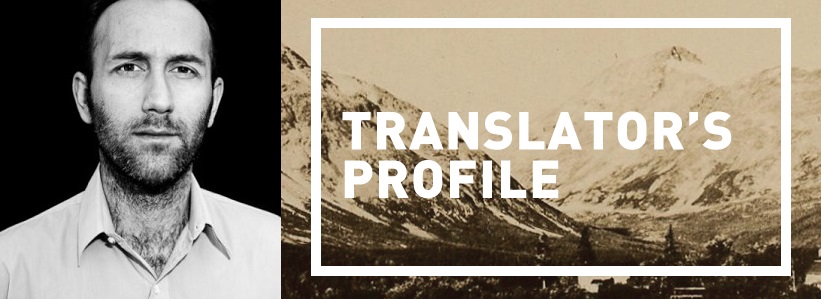
Q&A with K. E. Semmel, translator from the Danish and 2016 NEA Literary Translation Fellow.
K. E. Semmel is a writer and translator whose work has appeared in Ontario Review, Washington Post, World Literature Today, Southern Review, Subtropics, and elsewhere. His translations include books by Naja Marie Aidt, Karin Fossum, Erik Valeur, Jussi Adler Olsen, Simon Fruelund and, forthcoming in winter 2016, Jesper Bugge Kold. He is a recipient of numerous grants from the Danish Arts Foundation and is a 2016 NEA Literary Translation Fellow.
***
Who are you? What do you translate?
First, thank you for asking me to do this interview. I’ve started an interview series with the Santa Fe Writers Project (SFWP) called “Translator’s Cut,” in which I travel the globe, so to speak, interviewing translators about their work. So I’m more used to being on the opposite side of an interview.
Who am I? I’m a literary translator and writer, working from Danish to English (though I’ve translated some Norwegian and would do it again if the right opportunity presented itself). My educational background is in History and Literature, and my professional background is in the nonprofit world. For the past couple years, however, I’ve been translating full time. Like with any translator, I suspect, my primary reason for translating is that I love books and literature and want everyone to experience some really fantastic books that I happen to be able to render in English. READ MORE…
Translator’s Profile: Susan Bernofsky
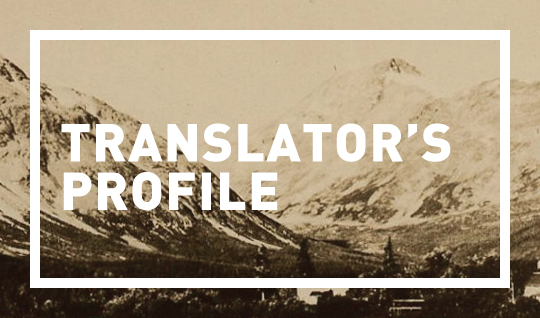
Q&A with Susan Bernofsky, translator from the German and Director of Literary Translation at Columbia University.
Susan Bernofsky directs the literary translation program in the School of the Arts MFA Program in Writing at Columbia University. She has translated over twenty books, including seven by the great Swiss-German modernist author Robert Walser, Kafka’s The Metamorphosis, Hesse’s Siddhartha and, most recently, The End of Days by Jenny Erpenbeck. Her many prizes and awards include a Guggenheim Fellowship this year, as well as the Helen and Kurt Wolff Translation Prize and the Hermann Hesse Translation Prize. She blogs about translation at www.translationista.net.
***
Asymptote: Describe your current/most recent project. Why is it cool? What should we know about it?
Susan Bernofsky: I’m working on a gorgeous and bizarre novel about polar bears by Yoko Tawada called ETUDES IN SNOW. It’s a three-generation story inspired by the short, tragic life of Knut, the baby polar bear born in the Berlin zoo in 2006, but that’s just the jumping-off point for her novel. It’s really a book about identity (national, species, etc.) All the main characters in the book are polar bears, and are described in their physicality as polar bears, but at the same time they move in human society, without any acknowledgment that there might be a contradiction here. The grandmother character, born in the Soviet Union, becomes a writer. As an author of polar bear extraction, she’s an ethnic minority. She later emigrates to Canada, from where her daughter returns to Europe, landing in East Germany, where she takes a job at a circus and experiences the fall of the Berlin Wall. It’s a funny, sad, moving book.
Translator’s Profile: Alyson Waters

Q&A with Alyson Waters, translator from the French and managing editor of Yale French Studies.
Alyson Waters’s translations from the French include works by Louis Aragon, René Belletto, Eric Chevillard, and Albert Cossery. She is the 2012 winner of the French-American Translation Award for her translation of Chevillard’s Prehistoric Times. Waters has received a National Endowment for the Arts Translation Fellowship, a PEN Translation Fund grant, and residency grants from the Centre National du Livre, the Villa Gillet, and the Banff International Literary Translation Centre. She teaches literary translation at New York University and Columbia University and is the managing editor of Yale French Studies. She lives in Brooklyn.
***
Asymptote: Describe your current/most recent project. Why is it cool? What should we know about it?
Alyson Waters: My current project is a translation of Jean Giono’s Un roi sans divertissement for New York Review Books. The title comes from one of Pascal’s Pensées: “A king without diversion is miserable; and therefore we see a great number of people constantly about the king whose sole task it is to amuse and avert the thought of the king from himself.” It’s an amazing book, a kind of existential mystery/roman noir. It has a very complicated structure, moving back and forth from the time of the telling of the story to the time of the events, and told in several narrative voices in an almost oral style. There’s a great passage in the book (among many) where the main narrator (or Giono?) inserts in the middle of his story the following:
“Obviously there exists a system of references comparable, for example, to the economic understanding of the world and in which Langlois’ blood and Bergues’ blood have the same value as the blood of Marie Chazottes, Ravanel, and Delphin-Jules. But there exists, encasing the first, another system of references in which Abraham and Isaac move logically, one following the other, toward Mount Moriah; in which the obsidian knives of the priests of Quetzalcoatl logically drive deep into selected hearts. And we are informed of this by beauty. One cannot live in a world where one believes that the exquisite elegance of the guinea fowl’s plumage is pointless. This is just an aside. I wanted to say it, and I did.” READ MORE…

